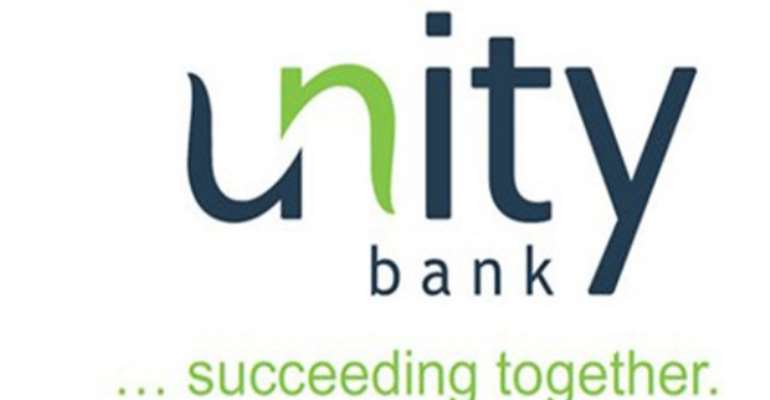Credit quality improvement lifts Unity Bank's profit

An improvement in risk asset quality of Unity Bank has resulted in a sharp drop in provisioning for credit losses, leading to improved profit performance. The drop in provisioning requirements has also provided shock absorbers that are shielding profit from both cost increases and revenue shortfalls.
The bank's operations in the second quarter show that provisions for anticipated loan losses dropped by about 74% to N360 million against the corresponding figure of N1.38 billion last year. The drop is against a 16.1% growth in the bank's net credit portfolio, indicating a significant gain in risk asset quality standard of the bank. Net credit volume has risen by 16.1% to N219.39 billion between December 2012 and June 2013.
The drop in loan loss provisions is also against a 16.3% improvement in gross earnings, which means a major revenue saving for the bank during the second quarter. The revenue saved provided the strength to improve profit margin and absorb a strong growth in interest expenses during the period.
Gross earnings of the bank amounted to N30.17 billion at the end of the second quarter in June, an increase of 16.3% over the N25.93 billion the bank posted in the second quarter of last year. It is an accelerated growth from the N14.71 billion gross income reported in the first quarter. Based on the second quarter growth rate, full year revenue is projected at N62.4 billion for Unity Bank in 2013. That will be an increase of 16.1% over the full year revenue figure of N53.76 billion in 2012.
The bank's after tax profit amounted to N3.70 billion in the second quarter. This is an increase of 23.5% over the second quarter net profit figure in 2012. It is however a slowdown from the after tax profit figure of N2.12 billion reported in the first quarter. Based on the second quarter growth rate, the bank's net profit is forecast at N7.8 billion at full year. That will be an increase of 26.2% over the net profit figure of N6.18 billion the bank earned in 2012.
The ability to grow profit ahead of revenue is gained from overall cost moderation in the second quarter. Net profit margin improved from 11.6% to 12.3% over the review period, which is also better than the 11.5% net profit margin recorded at the end of last year. Further improvement in profit margin is expected in line with the generally improving profit margins in the banking industry.
Apart from the drop in loan loss provisions, operating cost also showed a favourable behaviour during the period. At N15.33 billion, total operating cost of the bank grew by 10.5%, which is a moderation relative to the 16.3% growth in revenue. That lowered operating cost margin from 53.5% to 50.8% year-on-year at June. Operating cost margin is also down from 55.2% recorded in December 2012.
In line with the general industry trend, interest expenses claimed an increased share of gross income during the period. At N10.13 billion, interest cost rose by 41.4% in the second quarter. That represents 33.6% of revenue compared with 27.6% in the corresponding period last year. It is also higher than the 29.7% of gross earnings the bank devoted to payment of interest expenses at the end of last year. Banks, as well as industries, are all feeling the pinch of the prevailing high interest rates in the economy.
Interest income grew by 25.2% to N24.42 billion during the review period and accounted largely for the improvement in revenue achieved. Net fee and commission income fell by 37.3% to N4.0 billion in the second quarter. The drop was however remedied by both a significant growth in other operating income and the major drop in loan loss expenses.
The summary of the bank's operations in the second quarter is that there were both revenue improvements and disappointments and there were equally cost reductions as well as sharp increases. In all, revenue improvements and cost moderations were more than adequate to counter the shortfalls in incomes and major cost increases. That has permitted an increased profit capacity for the bank during the review period.
The bank earned 21 kobo per share at the end of the second quarter, improving from 17 kobo per share in the corresponding period last year. Full year outlook indicates earnings per share in the region of 44 kobo.
The bank did not pay any dividends for its last year's operations. Dividend prospects cannot be determined as at now in the light of the retained earnings position of the bank, which is still in negative numbers. However with strong growth in profit expected this year, the bank is expected to remedy its reserve position soon and resume dividend payment.
